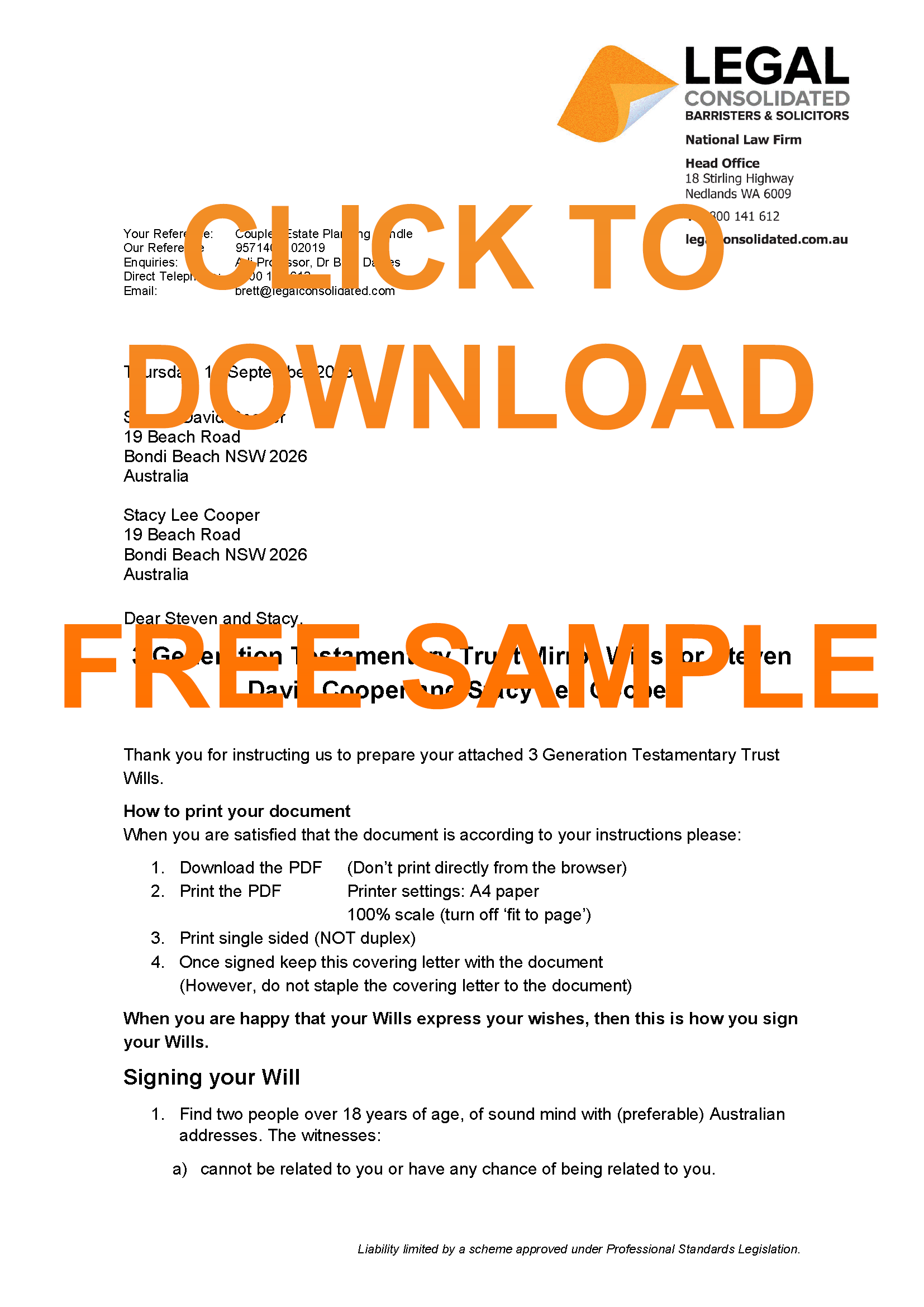
Medical Power of Attorney
$128 includes GST
-
For every state:
• NSW • VIC • QLD • WA • SA • TAS • NT • ACT
Australian Medical POA, Guardianships & Victorian Medical Treatment Decision Maker
Who looks after you, when you can’t? The government, retirement home, or doctors? Should they control your body? Do you trust your family more? If so make an Australian Medical POA.
Wife trapped in a retirement facility?
Our client had a wife. She was trapped in a high-end aged care facility. She had Alzheimer’s Disease. Our client wanted to get her out. The home said he had no right to touch or move a person. Not even a wife. He rang me in tears. I told him to go home and get the Medical Power of Attorney. He got it. Then he took it to the retirement facility. He got his wife out.
Escape a bad hospital with the Australian Power Of Guardianship
Our client’s wife was in hospital. The doctors were ‘behaving like Gods, not doctors’. Our client presented the Medical/Lifestyle POA. And he moved her to another hospital. There was nothing the doctors could do.
What is the value of a Medical and Lifestyle Power of Attorney?
The Guardianship POA allows you to appoint loved ones. If you lose mental capacity then they decide your:
- Personal lifestyle
- Where you live
- Medical treatment
But only if you can’t make decisions yourself.
Each state has its own guardianship document:
-
Enduring Power of Guardianship – New South Wales, Tasmania and Western Australia
-
Appointing Medical Treatment Decision Maker – Victoria
-
Enduring Power of Attorney – Australian Capital Territory and Queensland
-
Advanced Care Directive – South Australia
-
Advance Personal Plan – Northern Territory
-
Enduring Guardianship
-
Medical Enduring POA
Our power of guardianship protects you for the rest of your life:
- You and the attorneys you appoint are protected by our law firm
- Read the hints, watch the training videos, and speak with us as you build the lifestyle Power of Attorney
- Unlimited number of updates for the rest of your life for the lifestyle Power of Attorney
- For the rest of your life telephone the law firm anytime for help using lifestyle Power of Attorney.
- Your attorneys telephone us for help using the lifestyle Power of Attorney
- Your POA Guardianship is on a monitoring service, if the POA or legislation changes we notify you immediately
- The POA comes with a letter on how to sign and use the medical POA
Free and ongoing advice for attorneys on using the Australian Medical POA
Included in the cost of your Lifestyle Power of Attorney is free advice for your attorneys. Your attorneys are not alone:
- There is information about how to use the POA in our cover letter. The letter comes with the POA.
- Our law firm helps them and shows them how to use the POA. We are always available to them.
Many lifestyle Powers of Attorney built on government websites do not work. Sadly, only after you need to use them does this become apparent. We explain how each State’s Medical POA is signed and used on our law firm’s letterhead. We give ongoing advice until your death.
Legal Consolidated is responsible for lifestyle Power of Attorney. Often when a parent loses mental capacity the children telephone us for help and assurance. For free, we explain how to use the Medical POA and what they need to do.
Further, there are unlimited updates on the POAs. Update your Medical Power of Attorney as often as you wish.
Decisions by an enduring guardian
An enduring guardian makes decisions about:
- Where you live, whether permanently or temporarily
- Who you live with
- Whether you work
- Consent to medical & dental treatment
- Protecting life or ‘flicking the switch when in a vegetable-like state’
Obviously, if you are of sound mind then you make these decisions yourself. The Medical Treatment Decision Maker only starts doing the job when you are of unsound mind.
Free updates to your Lifestyle Power of Attorney
You can update your Medical POA for free. You can update your lifestyle POA as often as you wish for free.
In fact, our 3-Generation Testamentary Trust Wills and Enduring POAs can all be updated for free. As often as you wish. For the rest of your life.
When do t he Attorneys accept your Medical Treatment POA?
he Attorneys accept your Medical Treatment POA?
There is no legal requirement for a guardian or Medical Treatment Decision Maker to accept your POA within any time frame. A Guardian accepts your POA many years later. And if you appoint more than one attorney they accept many years apart from each other.
Your Medical Treatment Decision Makers do not need to accept your POA on the same day. Indeed your guardians may be living outside of Australia in different countries. However, your POA will not come into operation for that attorney until that attorney does sign. But the signing can be done when the POA is actually needed.
Does my attorney need to hold one of the original Medical Treatment POAs?
After you build your Lifestyle/Medical Treatment POA, you print off two copies.
You sign both copies. Both copies are originals. There is no legal requirement to hand over one of your original Medical Treatment POAs to any of your attorneys. You may, however, wish to do so. At the very least:
- You should speak to your potential medical attorneys. Make sure they are happy to take on the onerous job of holding the attorney position.
- Let them know where the Medical POA is kept. “At my home in my grey filing cabinet and when it is needed you can get the Medical Guardian POA and accept it then”.
- You may wish to email them a soft copy and the cover letter that we provide so they understand how it can be used in the future (it can be signed or unsigned, it is just a soft copy). If they need help, later on, they can telephone us.
Do I need a Medical Treatment POA in every State I live in?
Australia is a federation of States. Each State has its own Medical POA. For example, a NSW Medical POA only works while you are in New South Wales. If you live in two States then you build two Medical POAs. Build the first Medical POA for one state. Build the second Medical POA, as a second document, for the other state. (You carry over the answers from the first document into the second document. This saves you from having to answer the questions again.)
Can my Medical POA guardian ‘flick the switch’ if I am a vegetable?
Can the guardian turn off life support?
Confusingly, the State Advocate Office says:
“make treatment decisions on your behalf to any medical, surgical or dental treatment or other health care (including palliative care and life-sustaining measures such as assisted ventilation and cardio-pulmonary resuscitation)”
Most States have similar gibberish. They confuse the doctor, the lawyer, and mum and dads alike.
Dial-up the morphine – Guardian and Medical Treatment Decision Maker
It is rarely discussed publicly. But many palliative doctors are prepared to dial up the morphine. And the patient dies that night. But this is only after speaking with the guardian.
“Dialing up” the morphine is problematic.
Also problematic is using the Medical POA to stop medical treatment. The law is untested in Australia. What if the guardians agree with the doctor? This is to turn off life support. When is this legal?
State of Victoria – killing people with Medical Treatment Decision Maker
The brave State of Victoria was the first to allow euthanasia laws.
But this is different for people dying with a Medical Treatment Decision Maker document. Victoria’s laws relating to withholding and withdrawing life-sustaining treatment and guardianship are contained in three statutes:
- Guardianship and Administration Act 1986 (Vic) (Guardianship Act);
- Medical Treatment Planning and Decisions Act 2016 (Vic) (Medical Treatment Act); and
- Powers of Attorney Act 2014 (Vic) (Powers of Attorney Act).
The Medical Treatment Act 2016 started on 12 March 2018 – replacing the Medical Treatment Act 1988 (Vic) (previous Act). It regulates medical treatment decision-making. This includes consent to or refusal of the start or continuation of medical treatment. Some legal documents and substitute decision-making arrangements made under the previous Act continue to apply – where this is the case there is no need to build a new Advanced Health Directive. But you can do so by pressing “Build” above.
In the Medical Treatment Act 2016, medical treatment refers to the following treatments given by a health professional. This is to diagnose a physical or mental condition, prevent disease, restore or replace bodily function resulting from disease or injury, or improve comfort and quality of life:
- Treatment with physical or surgical therapy
- Treatment for mental illness
- Treatment with prescription pharmaceuticals, or approved Medicinal cannabis (under the access to Medicinal Cannabis Act 2016)
- Dental treatment; and
- Palliative care.
Victoria does not allow medical research procedures with a Medical Treatment Decision Maker
The Medical Treatment Act 2016 also regulates supported decision-making. It enables a ‘support person’ to be appointed to support the person to make medical treatment decisions and represent the person’s interests regarding treatment. Supported decision-making is discussed further below.
The Guardianship Act deals with substitute decision-making for people with impaired capacity. The Powers of Attorney Act governs powers of attorney and enduring powers of attorney and, following the commencement of the Medical Treatment Act 2016, it will not relate to medical treatment decisions. However, an Enduring Power of Attorney made under previous legislation immediately before 12 March 2018 will continue to apply.
So the law is still uncertain. The best course of action is to make your Medical POA for your State or Territory. And speak openly with your spouse, children, and loved ones who hold that lifestyle POA.
Medical POA vs an Advance Care Directive
Every State and Territory has some type of Enduring Power of Guardianship. It appoints someone else (an attorney) to make decisions on your behalf.
Each State and Territory has a type of Advance Care Directive. This is where you write down what you want if you are, for example, a vegetable. Or you are Jehovah’s Witnesses and do not want blood transfusions.
Your Advance Care Directive states your wishes. This is direct to your medical treatment provider. This is if you are unable to express those wishes for medical treatment.
- Medical POA: you appoint someone (an attorney) to direct the doctors
- Advance Care Directive: your words and wishes are on a piece of paper and your doctor reads that directly. It overrides your attorney.
Australian Lifestyle and Medical POAs vs Advance Care Directives
The names of advance care directives vary between states and territories. To add to the confusion, the scope of medical preferences also varies:
- NSW: Enduring Guardian vs Advance Care Directive
- Victoria: Appointing Medical Treatment Decision Maker vs Advance Care Directive
- QLD: Enduring Power of Attorney vs Advance Health Directive
- WA: Power of Guardianship vs Advance Health Directive
- SA: Advance Care Directive vs Advance Care Directive (appointing the Guardian and the directives are in the same document)
- TAS: Enduring Power of Guardianship vs Advance Care Directive
Advance Care Directives are silly and dangerous
All this sounds wonderful. But giving directions directly to doctors does not work. It is dangerous. In fact, I have never used this word before, but a medical directive is stupid.
Let me tell you why.
Your wife sits down with her doctor and lawyer. Over the next 5 days, she works out all the diseases and problems she may have. For example:
If I have my third stroke and cannot eat but I can use the toilet I want this to happen…
A few years later she had a third stroke. She cannot eat but she can use the toilet.
You pull out the medical directive that she wrote. You turn to page 327. You read out to the medical specialist what your wife wants.
The medical specialist looks at you with a whimsical stare and states
I have no idea what you mean by the word ‘stroke’. But in any event, rather than “dial-up” the morphine, tonight, why not just give her this tablet? She can go home tomorrow to cook your supper. Medical science has changed dramatically in the last two years.
Did not your wife trust you to carry out her wishes as your attorney? Do not damage the Power of Guardianship. Avoid the care directives.
Q: I do not want to mess up my Medical POA with an Advance Health Directive. But do I provide a letter of my wishes?
A: Legal Consolidated does not mind letters of wishes. They do not have the force of law. But they can be helpful if your spouse or children have forgotten what you want. For example, this is fine:
‘I want to live. So use all available medical treatments. Only withdraw any life-sustaining treatment if, on consultation with appropriate medical professionals, such treatment is deemed futile or non-beneficial.’
Would your spouse and children forget this? But it is your call if you want to make some notes and keep them together with your lifestyle POA, Enduring POA, and Wills.

